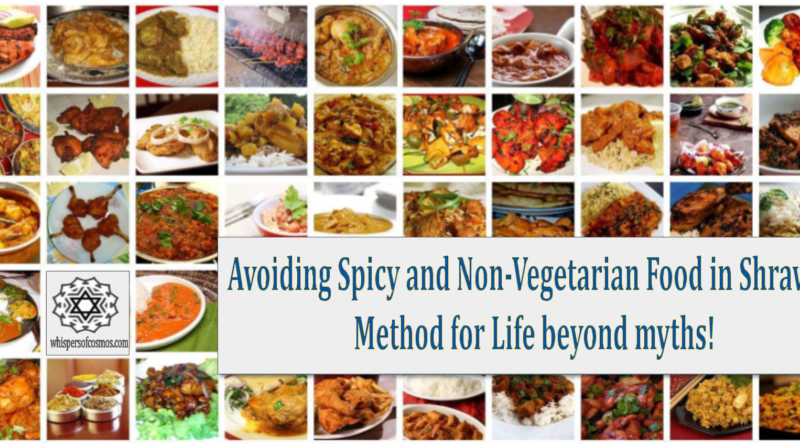Avoiding Spicy and Non-Vegetarian Food in Shravan: Method for Life beyond myths!
Hinduism is one of the oldest religions and cultures in the world, boasting a rich heritage and diverse mythology with practices often rooted in scientific reasoning. This article explores the scientific rationale behind some practices observed during the holy month of Shravan, particularly fasting and avoiding certain foods.
Shravan Month, the fourth month in the Hindu calendar, typically falls between late July and late August. It holds special significance for devotees of Lord Shiva, who often observe special rituals and prayers, particularly on Mondays known as Shravan Somvar. Across India, some individuals choose to abstain from non-vegetarian food during this month.
If we look for the scientific aspect of fasting in Shravan, this period coincides with the monsoon season, characterised by humidity and a transition from summer’s heat to a more moderate climate. The human body needs time to adjust to these changes. The monsoon season is also known for a peak in viral infections due to increased humidity.

According to Ayurveda and the traditional Indian medical system, the digestive system generally weakens during this time. Fasting or consuming lighter meals can aid digestion and potentially contribute to the body’s ability to fight off illnesses. Starch-rich foods like sago and buckwheat flour, commonly consumed during Shravan fasts, provide essential nutrients while being easily digestible and less susceptible to spoilage in the humid environment.
During Shravan Month, dietary choices can prevent potential diseases which can occur in this phase of every year. If we deep dive into it we can see that the monsoon season, while bringing relief from the scorching heat, also brings some potential health challenges along with it. It causes increased humidity that can contribute to the spread of bacterial and viral infections, leading to issues like indigestion, diarrhoea, and foodborne illness.
So if we consider these issues in context of our digestive system, during the monsoon, some individuals may experience weakened digestion due to factors like humidity and changes in dietary choices. This can make it more difficult to digest heavy meals, including those high in fat or protein.
A person who avoids non-vegetarian food can have a healthy and balanced transition during this monsoon. Several scientific, Ayurvedic, and scholarly arguments support the practice of avoiding non-vegetarian food during this month. The ancestors have inclined this angle towards spiritual belief but it has been difficult to explain the nuances of health concerns to everyone which might occur due to having a heavy protein rich diet during this time. In hindu calendar, Shravan month determines the transition phase of the summer season into a rainy one every year.
So if we correlate this time period with scientific aspects and challenges of the digestive system, this makes more sense. Meat, poultry, and fish are generally considered more challenging to digest compared to plant-based foods. During a period of potential digestive vulnerability, lighter vegetarian options may ease the digestive process. Non-vegetarian food also often contains higher levels of saturated fat, which may increase inflammation and potentially weaken the immune system. Opting for plant-based alternatives during Shravan can contribute to a healthier overall diet.
It’s crucial to emphasise proper food safety practices during the monsoon. Meat and dairy products can be more susceptible to spoilage due to increased humidity and potential contamination. Careful handling, preparation, and storage of these foods are essential to prevent illness. So it is also in practice to avoid dairy products during this time. This is also linked to that spiritual act of offering milk to lord Shankar’s Shivlinga which basically explains about avoiding consumption of dairy product during this time as the dairy producing animals such as cow, buffalo, goats themselves experiences the same transition phase of monsoon and they take the grains which makes the dairy products more vulnerable and susceptible to several disease.
If we consider different angles with respect to the animals’ well being and existence on the planet. This is considered to be a breeding Season for them and Ethical Considerations compels them to avoid non-vegetarian food at that time. While some traditions encourage avoiding seafood, poultry, and eggs during Shravan due to their breeding seasons, it’s important to acknowledge that scientific evidence on the direct impact of this practice on animal populations is limited.
Ultimately, the decision to observe specific dietary practices during Shravan is a personal one. However, it’s crucial to base choices on accurate information and responsible food safety practices, regardless of religious beliefs or cultural traditions.



